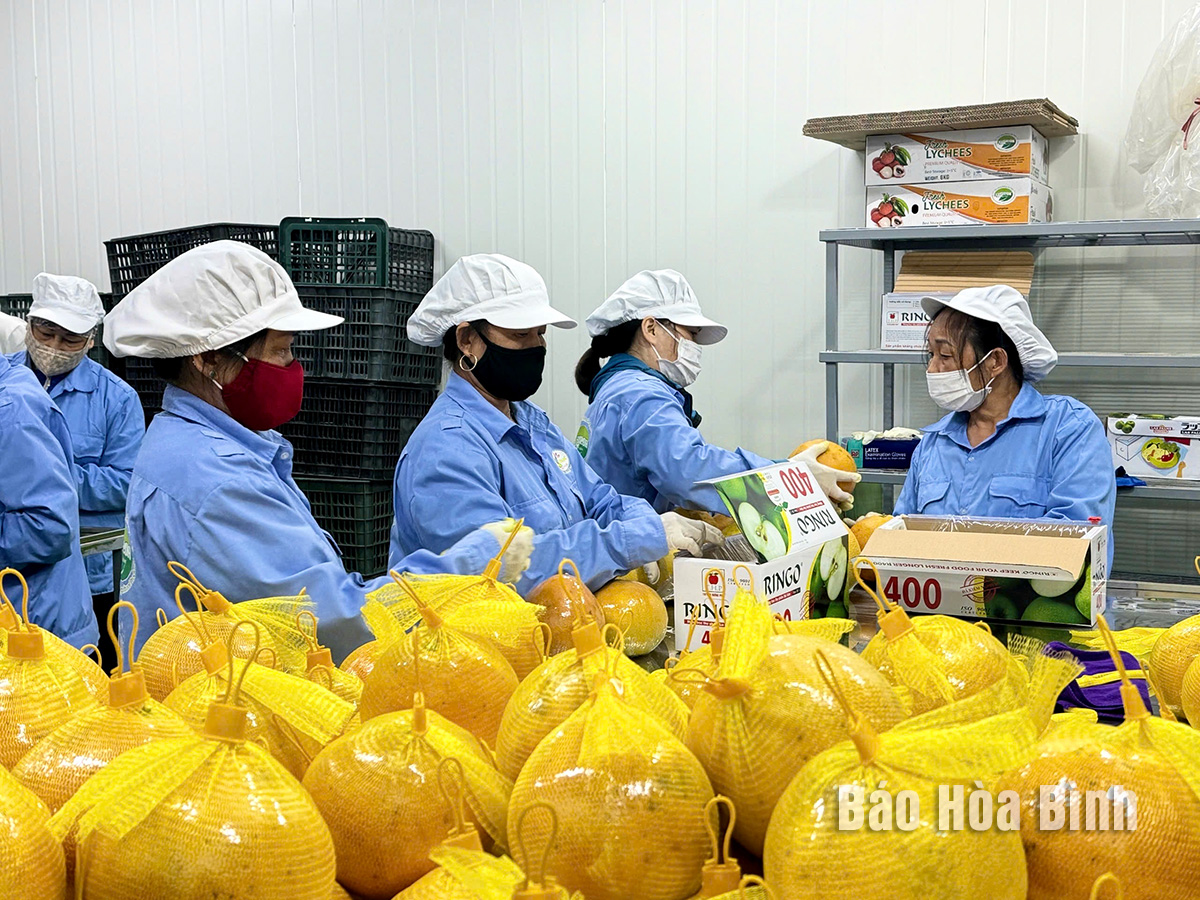
In mid-December, the landscapes of many neighbourhoods and villages in Tan Lac district come alive with vibrant colours and bustling activity as pomelo orchards enter peak harvest season.

Tan Lac red pomelos are packaged by Fusa
Organic Agriculture JSC and exported by ECO Hoa Binh JSC in late November 2024.
At the 14-year-old orchard of Pham Van Hoi in Tan Phong, Man
Duc town, Tan Lac district, hundreds of freshly picked pomelos are packed into
bags and loaded onto carts to fulfil merchant orders. Hoi shared that his
nearly 3,000 sq.m orchard is cultivated according to VietGAP standards. This
year’s prices have dipped slightly compared to the previous season, he noted.
According to the Tan Lac Agriculture and Rural Development
Office, the district has over 1,100 hectares of the fruit under harvest. As of
September 30, more than 217 hectares have been certified under VietGAP or
organic standards, with designated codes for domestic cultivation and exports.
Concentrated plantations in Thanh Hoi, Dong Lai, and Tu Ne communes generate
high incomes, averaging between 380 – 415 million VND (14,933 – 16,308 USD) per
hectare. Its pomelo production for 2024 is projected to exceed 17,600 tonnes,
catering to both domestic and foreign markets.
Alongside Tan Lac, farmers in major pomelo-growing regions
such as Luong Son, Kim Boi, and Yen Thuy are also hard at work harvesting to
fulfil orders. Across the province, cultivation spans approximately 5,400
hectares. The 2024 harvest is expected to yield about 105,000 tonnes, with the
Dien pomelo harvest set to conclude by mid-January 2025.
This season, three types of the fruit are being exported,
namely Dien, Tan Lac red pomelos, and green-skinned pomelos, which makes its
debut. However, the impact of natural disasters, particularly Typhoon Yagi, has
reduced the percentage of export-grade fruits. Prolonged rains led to increased
pest infestations, affecting their appearance despite their excellent internal
quality and Brix levels.
Nguyen Hong Yen, the head of the provincial sub-department
of crop production and plant protection, noted that to enhance pomelo export
volumes this season, the Hoa Binh Department of Agriculture and Rural
Development has implemented several key measures. Among these, 35 planting area
codes were issued for exports to markets including Australia, New Zealand, the
UK, the US, the EU, and the Republic of Korea. The total pomelo export volume
is projected to reach between 250 and 300 tonnes in 2024.
Hoa Binh province’s economy posted an impressive Gross Regional Domestic Product (GRDP) growth rate of 12.67% in the first quarter of 2025, representing a 12.76% year-on-year increase, the highest rate recorded since the beginning of the current tenure, according to the provincial Statistics Office. This robust growth reflects years of strategic groundwork and sets a strong foundation for the province’s annual growth target of over 10%.
With a focus on cash crop farming with science - technology application and brand building, Lac Thuy district is gradually increasing production value, improving people's life quality, and laying the foundation for sustainable socio-economic development.
In recent years, the economic development model "Hoa Binh Earthworm Farm” run by Mr. Bui Van Dang in Co Giua Hamlet, My Thanh Commune (Lac Son district) has not only brought stable economic value but it is also environmentally friendly, helping to protect and reduce pollution, contributing to the construction of a green and sustainable agriculture.
Dao Village’s honey – a product certified with a 3-star OCOP (One Commune One Product) rating by Thong Nhat Agricultural Cooperative in Dao Village (Hoa Binh City) – is highly regarded by consumers for its quality, richness, and variety in packaging. The distinctively sweet taste of Dao Village’s honey leaves a lasting impression on anyone who has tried it.
In alignment with Project No. 07-DA/TU, issued by the Hoa Binh provincial Party Committee on November 1, 2021, Lac Thuy district has actively promoted investment and supported the sustainable development of its industrial and handicraft sectors during the 2021–2025 period. Alongside this, the district has remained committed to preserving and revitalising traditional craft villages.
Located in the northern part of Lac Thuy district, with a temperate climate and fertile soil, Phu Thanh commune has great potential and advantages in growing tea. The long-standing experience, combined with strict adherence to organic farming practices in the tea gardens, ensures that the dried tea products from Phu Thanh and Lac Thuy as a whole are sold out immediately upon production, providing a stable and prosperous life for the local people.



